Turkey, US reach ceasefire deal, Kurds to withdraw from 'safe zone'
After nine days of hectic diplomacy and military offensive in Syria, Turkey and the U.S. reached a ceasefire deal that includes the withdrawal of YPG militants. The deal was hailed by both Ankara and Washington, with Trump saying, 'Millions of lives will be saved.'
Duvar English
Turkey agreed on Oct. 17 to pause its offensive in Syria for five days to let Kurdish forces withdraw from a "safe zone" Ankara had sought to capture, in a deal hailed by Washington but which Turkish leaders cast as a complete victory.
The 120-hour truce was announced by U.S. Vice President Mike Pence after talks in Ankara with Turkey's President Recep Tayyip Erdoğan, and was swiftly hailed by President Donald Trump, who said it would save "millions of lives."
But if implemented it would achieve all the main objectives Turkey: control of a strip of Syria more than 30 kilometers deep, with the Syrian Kurdish People's Protection Units (YPG) militia, formerly close U.S. allies, obliged to pull out.
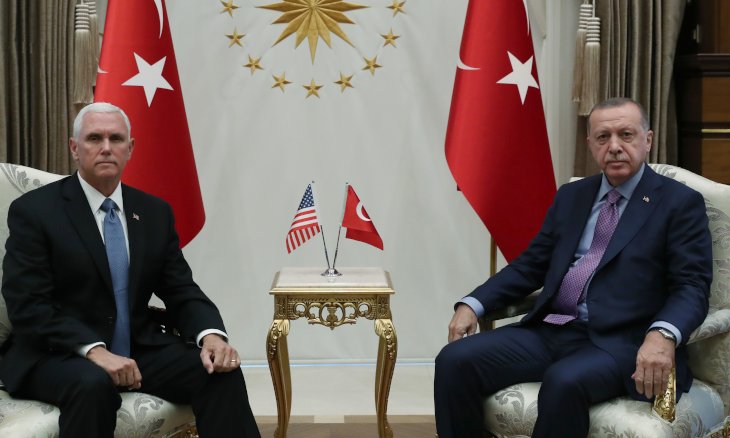
"The safe zone will be primarily enforced by the Turkish Armed Forces," a joint U.S.-Turkish statement released after the talks said.
It said Washington and Ankara would cooperate on handling ISIS militants and family members held in prisons and camps, a major international concern. Pence said U.S. sanctions imposed on Oct. 15 would be lifted once the ceasefire became permanent.
"With the implementation [of the ceasefire] the U.S. will not impose further sanctions on Turkey," he said.
"The president has decided to withdraw the economic sanctions" once the operation is done, he added.
Turkey launched its long-sought military offensive called Operation Peace Spring in northeastern Syria on Oct. 9 with several aims, including clearing the border from the YPG-led Syrian Democratic Forces (SDF) and setting up a "safe zone" in order for the return of over one million refugees.
Ankara wants its borders cleared of the YPG due to it being the Syrian affiliate of the Kurdistan Workers' Party (PKK), which is designated as a terrorist organization by Turkey, the U.S. and the European Union.
A Turkish official told Reuters Ankara got "exactly what we wanted" from the talks with the United States.
Turkish Foreign Minister Mevlüt Çavuşoğlu described it as a pause, solely to allow the Kurdish militants to withdraw.
YPG militants would be forced to give up their heavy weapons and their positions would be destroyed, Çavuşoğlu said, while declining to call the agreement a "ceasefire," saying ceasefires could be agreed only by legitimate sides, and not by "terrorists."
"When the terrorist elements completely leave the safe zone, we can stop the operation," Çavuşoğlu said on Oct. 17.
He said Turkey would discuss the town of Manbij and other regions with Russia, which, along with the Syrian government forces, have deployed in several positions vacated by the U.S.
Çavuşoğlu was quoted earlier on Oct. 17 as saying Moscow had promised Ankara that the YPG militia will not be in the Syrian territories across the border.
Pence said Washington had already been in contact with the SDF, which had agreed to withdraw and were already pulling out.
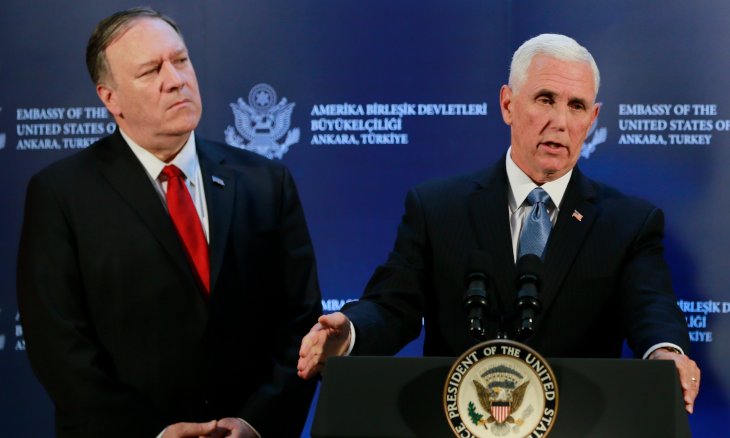
Trump tweeted: "Great news out of Turkey."
"Thank you to Erdogan," Trump said. "Millions of lives will be saved!"
In his reply, Erdoğan said that "many more lives will be saved when we defeat terrorism."
"Mr. President, many more lives will be saved when we defeat terrorism, which is humanity's arch enemy. I am confident that this joint effort will promote peace and stability in our region," Erdoğan said in a tweet late on Oct. 17.
Mr. President, many more lives will be saved when we defeat terrorism, which is humanity's arch enemy. I am confident that this joint effort will promote peace and stability in our region.
— Recep Tayyip Erdoğan (@RTErdogan) October 17, 2019
"Today the United States and Turkey have agreed to a ceasefire in Syria," Pence told a news conference after more than four hours of talks at the presidential palace in Ankara.
"The Turkish side will pause Operation Peace Spring in order to allow for the withdrawal of YPG forces from the safe zone for 120 hours," Pence said.
"All military operations under Operation Peace Spring will be paused, and Operation Peace Spring will be halted entirely on completion of the withdrawal," he added.
Pence said the sanctions would be lifted once the ceasefire became permanent.
.@VP: Today, the United States and Turkey have agreed to a ceasefire in Syria. pic.twitter.com/SXAsYq8Xnm
— Department of State (@StateDept) October 17, 2019
The deal struck with Erdoğan also provided for Turkey not to engage in military operations in the flashpoint Syrian border town of Kobani, Pence said, although Çavuşoğlu said Ankara had given no commitments about Kobani.
Pence added that he had spoken to Trump after the talks and that Trump had expressed his gratitude for the ceasefire accord. Washington's main goal had been to halt the violence, and it had succeeded, Pence said.
Honored to lead this delegation on behalf of President @realDonaldTrump. Thank you @SecPompeo, NSA Robert O'Brien and Ambassador James Jeffrey for your dedication and hard work in Turkey. pic.twitter.com/UYCkdOyeXJ
— Vice President Mike Pence (@VP) October 18, 2019
Trump commented on the issue once again after Pence's press release, saying "This is a great day for civilization."
This is a great day for civilization. I am proud of the United States for sticking by me in following a necessary, but somewhat unconventional, path. People have been trying to make this “Deal” for many years. Millions of lives will be saved. Congratulations to ALL!
— Donald J. Trump (@realDonaldTrump) October 17, 2019
This deal could NEVER have been made 3 days ago. There needed to be some “tough” love in order to get it done. Great for everybody. Proud of all!
— Donald J. Trump (@realDonaldTrump) October 17, 2019
Pence led the delegation that included Secretary of State Mike Pompeo, National Security Advisor Robert O’Brien and the special representative for Syria, James Jeffrey.
The aim of the U.S. delegation was announced as persuading Turkey to end its offensive.
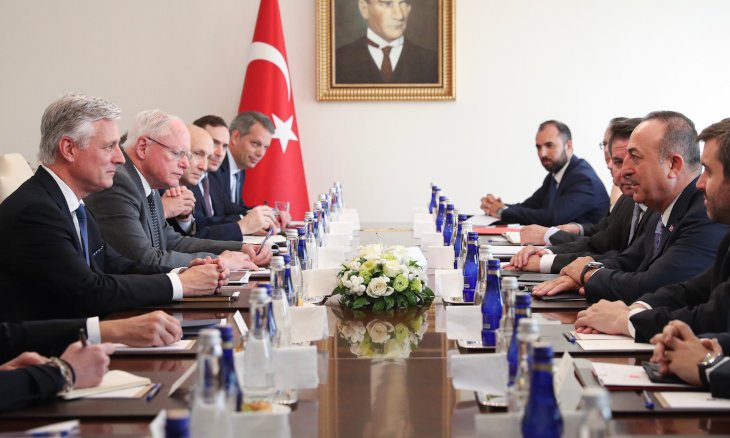
Jeffrey said late on Oct. 17 the agreement defined the safe zone as the areas where Turkey was now operating, down 30 kilometers in central northeastern Syria, adding Turkey was in separate talks with the Russians and the Syrians about other parts of the region.
"We have a very [convoluted] situation with Russian, Syrian Army, Turkish, American, SDF and some Daesh elements all floating around in a very wild way," he told reporters, using an Arabic acronym for ISIS, as Secretary of State Mike Pompeo flew to Tel Aviv from Ankara.
"Now, the Turks have their own discussions going on with the Russians and the Syrians in other areas of the northeast and in Manbij to the west of the Euphrates," he also said.
"Whether they incorporate that later into a Turkish-controlled safe zone, it was not discussed in any detail," Jeffrey added.
"That right now is not Turkish controlled territory."

Saying that the U.S. struck the agreement in part because the U.S. believed the Kurds would not be able to hold that area militarily anyway, Jeffrey noted that "There's no doubt that the YPG wishes that they could stay in these areas."
"It is our assessment that they have no military ability to hold onto these areas and therefore we thought that a ceasefire would be much better ... for trying to get some kind of control over this chaotic situation," he added.
Trump has been under bipartisan fire for abandoning Kurdish militants, Washington's main partners in the battle to dismantle ISIS' so-called caliphate in Syria, by withdrawing troops from the border following a phone call with Erdoğan on Oct. 6.
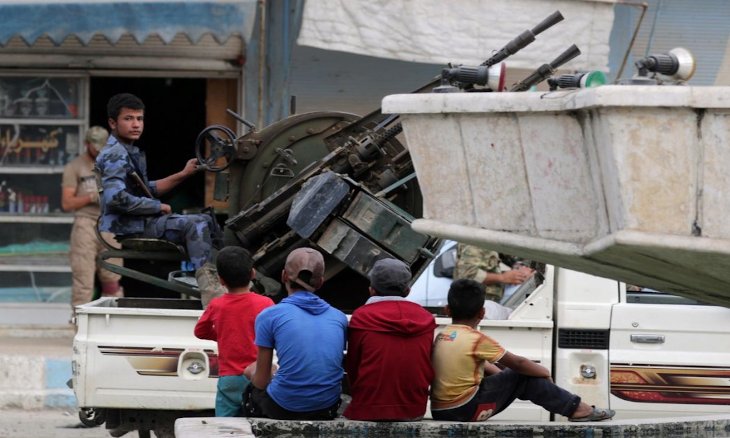
Trump had defended his move on Oct. 16 as "strategically brilliant." He said he thought Pence and Erdoğan would have a successful meeting, but warned of sanctions and tariffs that "will be devastating to Turkey's economy" otherwise.
At his campaign rally in Dallas on Oct. 18, Trump brought up the ceasefire agreement, saying that he had to let the Kurdish militants and Turkey "fight a little while" before the U.S. would be able to stop the offensive.
“Sometimes you have to let them fight a little while, then people find out how tough the fighting is,” he told his supporters.
“Sometimes you have to let them fight like two kids in a lot, you gotta let them fight, and then you pull them apart," he added.
Referring to both sides as a "friend," Trump said that Turkish and Kurdish forces "fought for a few days" before the U.S. "went there and we said, ‘we want a pause.’"
"President Erdoğan was a gentleman, he understood. But without a little tough love … they would’ve never made this deal," he added.
Trump also promised to recapture ISIS operatives and their families who reportedly escaped during the fighting between Turkey and the YPG.
Thank you Dallas, Texas - I love you! #TrumpRallyDallas #KAG2020 https://t.co/meWpesDYeM
— Donald J. Trump (@realDonaldTrump) October 18, 2019
"We’re going to keep ISIS all nice and locked up. We’re going to find more of them. Turkey's going to be happy, the Kurds are going to be happy, ISIS is going to be unhappy," he added.
Trump announced sanctions on Turkey on Oct. 15, after the assault began, but critics said these were too little, too late.
U.S. senators who have criticized the Trump administration for failing to prevent the Turkish assault in the first place said they would press ahead with legislation to impose sanctions against Turkey despite the ceasefire announcement.
U.S. House Speaker Nancy Pelosi and Senate Democratic leader Chuck Schumer on Oct. 17 called the ceasefire agreement a "sham."
The agreement "seriously undermines the credibility of America's foreign policy and sends a dangerous message to our allies and adversaries alike that our word cannot be trusted. President Erdoğan has given up nothing, and President Trump has given him everything," Pelosi and Schumer said in a statement.

Congress's top Democrats said the House of Representatives would vote on a bipartisan sanctions package against Turkey next week.
Senator Mitt Romney, a Republican, said the agreement "is far from a victory" and demanded the administration explain what will happen to the Kurds, what will be the future U.S. role in the region and why Turkey "will face no apparent consequences."
"What President Trump agreed to today is a capitulation to Turkey at the expense of our Kurdish allies," Senator Maggie Hassan, a Democrat, said in a statement, saying "the agreement lets Turkey off the hook for slaughtering innocent civilians."
Republican Senator Lindsey Graham and Democratic Senator Chris Van Hollen announced legislation that would impose "crippling" sanctions on the government in Ankara shortly before the agreement was announced.
The bill would target Turkish officials, end U.S. military cooperation with the NATO ally and mandate sanctions over Turkey's purchase of a Russian S-400 missile defense system.
Leaders of the Senate Foreign Relations and House of Representatives Foreign Affairs committees also unveiled sanctions measures with bipartisan support on Oct. 17, with many of the same provisions.
None of the lawmakers sponsoring the bills planned to abandon them, saying they viewed the threat of tough sanctions as leverage to ensure that Turkey complied with the ceasefire and left Kurdish areas in northern Syria for good.
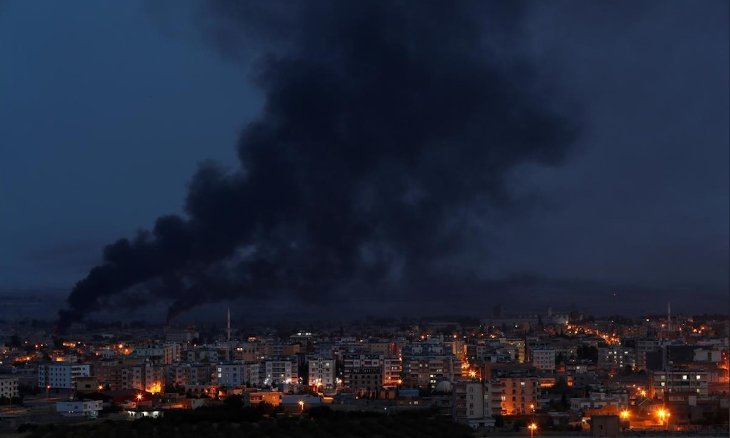
"Turkey has legitimate national security concerns within Syria but they cannot be met by invasion and force of arms," Graham said in a statement.
"Senators Van Hollen and Graham have spoken, and they agree on the need to move full steam ahead with their legislation," said Bridgett Frey, a Van Hollen spokesman. A spokesman for Graham also said they were going to move ahead.
Turkey has legitimate national security concerns within Syria but they cannot be met by invasion and force of arms.
— Lindsey Graham (@LindseyGrahamSC) October 17, 2019
Graham predicted his proposal would pass the Senate with enough support - a two-thirds majority - to overcome a possible veto by Trump.
Representative Eliot Engel, the Democratic chairman of the House of Representatives Foreign Affairs Committee, said it was far too soon to consider abandoning the sanctions push.
"I'm glad there's a ceasefire. It's a good sign, but let's see if it lasts and let's see what it really means," Engel told reporters.
Republicans hold a majority in the Senate. Democrats control the House.
Turkey's incursion into Syria has marked one of the rare times when congressional Republicans have disputed a Trump policy.
Announcing the sanctions with Graham, Republican Senator Marsha Blackburn said the bill would not be the last step in Congress' effort to influence Ankara. "Turkey could stop this right now if they wanted to," she said.
"Congress is going to speak with a very firm, singular voice, that we will impose sanctions in the strongest measure possible against this Turkish outrage that will lead to the re-emergence of ISIS, the destruction of an ally, the Kurds and eventually benefit to Iran to the detriment of Israel," Graham told a news conference announcing the bill.
This sham ceasefire does nothing to stop thousands of ISIS from prisoners from escaping, and shows the President’s complete lack of strategy to defeat ISIS.
— Nancy Pelosi (@SpeakerPelosi) October 17, 2019
He also said he thought a resolution opposing the offensive in Syria, which passed the House overwhelmingly on Oct. 16, would get more than 80 votes in the 100-member Senate, if the chamber's Republican leaders allowed a vote.
The measure passed the House by 354 to 60. Shortly afterward, Trump and House Speaker Nancy Pelosi exchanged barbs as a White House meeting on Syria policy.
Democrats sought a Senate vote on the resolution early on Oct. 17, but were prevented by Republican Senator Rand Paul.
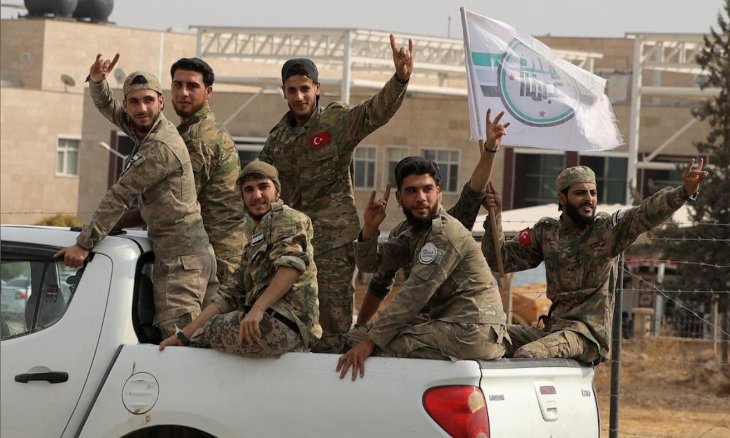
Russia, Damascus' major ally alongside Iran, brokered a deal between Kurdish militants, who branded Trump's decision as a betrayal, and the Syrian government after U.S. troop withdrawal.
As a result of the deal, Syrian army forces entered the cities held by Kurds to protect them from the Turkish offensive.
Turkey has been a staunch opponent of Syrian President Bashar al-Assad since the beginning of the war in 2011 and has repeatedly called on him to step down.
With Russia, however, relations have been remarkably well, with Russian President Vladimir Putin and Erdoğan coordinating in a number of issues, including the situation in Syria's northwest.
The Kremlin said late on Oct. 17 it expected to receive information from Turkey regarding the five day ceasefire.
"We expect to receive information from Turkey," RIA quoted Kremlin spokesman Dmitry Peskov as saying.
Erdoğan is due to hold talks with Putin about Syria on Oct. 22 in southern Russia.
Another statement came from the Syrian government, with Assad's advisor Bouthaina Shaaban describing the ceasefire agreement as "vague."
Speaking to Al-Mayadeen TV on Oct. 17, Shaaban said Damascus "cannot accept" another Iraqi Kurdistan in Syria, adding that "important steps" had been taken so far with the SDF, but that all remaining issues could not be resolved at once.
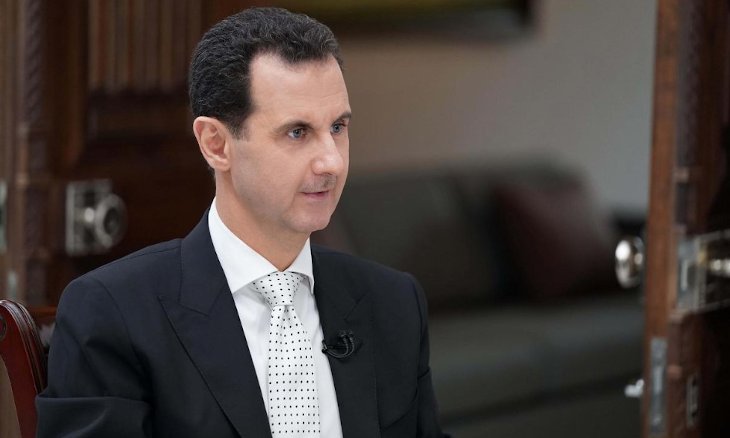
Earlier on the same day, Russian Foreign Minister Sergei Lavrov and his Iranian counterpart Mohammad Javad Zarif, have discussed situation in northeastern Syria and expressed their readiness to facilitate relevant talks, Russian foreign ministry said.
Both Lavrov and Zarif said it was necessary to reach long-lasting stabilization on the eastern side of the Euphrates river via the “dialogue between Damascus and Ankara, as well as between the Syrian authorities and representatives of Syrian Kurds."
They said Russia and Iran are ready to facilitate such contacts.
Despite the ceasefire, shelling and gunfire resounded around the northeast Syrian town of Ras al Ain on Oct. 18.
Machine-gun fire and shelling could be heard from the Ceylanpınar district of the southeastern province of Urfa across the border from Ras al Ain, and smoke rose from one part of the Syrian town.
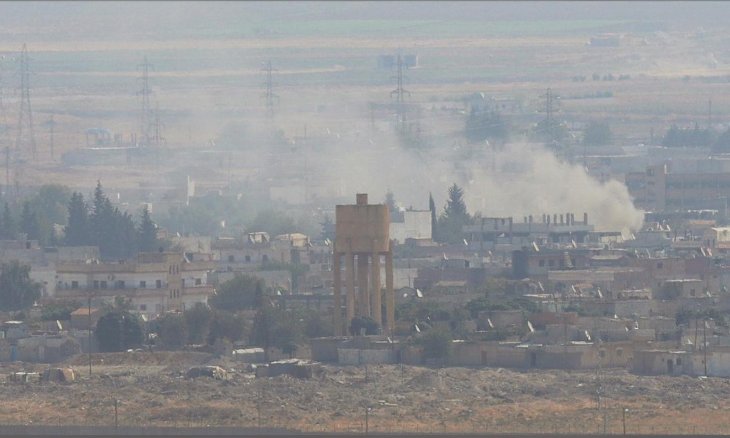
SDF commander Mazloum Kobani told Kurdish broadcaster Ronahi TV late on Oct. 17 the group would accept the ceasefire agreement but said it was limited to the border areas running between Ras al Ain and the town of Tal Abyad.
Kobani said the agreement was "just the beginning" and would not achieve Turkey's goals.
Aldar Xelil, a leading Syrian Kurdish politician, told Al Arabiya that the Kurds would abide by the ceasefire but would defend themselves.
United Nations Secretary-General Antonio Guterres, meanwhile, welcomed “any efforts” to de-escalate the situation in northern Syria and protect civilians, a U.N. spokesman said in a statement on Oct. 17.
“The Secretary-General recognizes that there is still a long way to go for an effective solution to the crisis in Syria,” U.N. spokesman Farhan Haq said in a statement.
